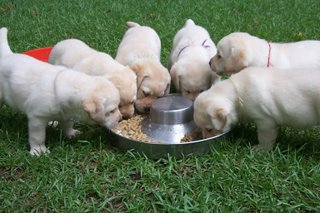
It's been a long time--in fact, too long--but I can't remember when we ever fed puppy food to our puppies. We have fed Pro Plan Lamb and Rice adult food from the time the puppies first start being weaned. I've talked to several orthopods and vets about the "large breed" forumlas and most feel that it is a hype and not really necessary. I can't argue with success as we have had very few orthopedic problems since we have been feeding the adult food. We grind up the large adult kibble in an old-fashioned hand cranked grinder (good for a workout!), add in some Half and Half, then some applesauce, and some Gerber chicken and rice baby food. This mess is then mixed with warm water to make a nice slurpy dish for the babies.
Most of the time they walk in the food, lie in the food bowl, and sometimes poop in the flying saucer (thankfully, this doesn't happen often). We keep feeding the gruel until they are around 6 weeks and then go to regular kibble with just the half and half and some canned Pedigree chopped chicken added. By the time, they are ready to go home, they are eating regular adult sized kibble with only a bit of Pedigree added in.
Why mess with success by changing the puppies to puppy food or LB formula? We don't advise it and give out instructions indicating what to feed. I don't care if the brand is switched from Pro Plan but don't advise changing from an adult formula.
What was the rationale for creating a large breed formulation in the first place? Over-nutrition of puppies – most especially excess amounts of protein and calcium – is implicated in the development of a number of growth and bone development disorders such as OCD and panosteitis. It also greatly exacerbates the development of hip dysplasia, which occurs most frequently in large and giant breeds. So for these dogs, pet food manufacturers have come up with reduced protein and calcium formulas, often with glucosamine and chondratin supplements added “to ease painful joints”. Well, glucosamine and chondratin may be useful supplements in easing the pain of arthritic and otherwise damaged joints (the jury is still out on that one) but the small amounts added to pet food are unlikely to be effective. More importantly, there is no evidence to suggest that they may be helpful in preventing the development of joint conditions in the first place. Perhaps the biggest flaw with the food is that puppy growth problems are at least partially attributable to over-nutrition, and excess amounts of protein and calcium commonly found in puppy formulas. In some cases, puppy foods can have protein levels up to around 44% (versus around 22-25% for adults). So why would you feed a puppy formula in the first place? There is no reason to suspect puppies need different food from adults – and post-weaning, they certainly wouldn’t have received different food sources in a natural environment. Our advice would be to avoid the large breed and puppy formulations completely, and to choose instead a good quality adult or all-life-stages food instead. If you do choose to feed a puppy food, please ensure that the protein and calcium levels are not excessive and switch to an adult food by around 4-6 months.
I've created this poll to get your opinions:
HAPPY BIRTHDAY BOB!!!

1 comment:
Cute picture. Are those Stella's babies?
Post a Comment